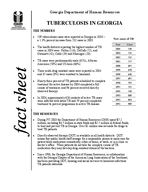Georgia Department of Human Resources
TUBERCULOSIS IN GEORGIA
THE NUMBERS
539 tuberculosis cases were reported in Georgia in 2004 a 1.3% percent increase from 532 cases in 2003.
The health districts reporting the highest number of TB cases in 2004 were: Fulton (116), DeKalb (72), and Gwinnett (42), Cobb (29) and Muscogee (20).
TB cases were predominantly male (61%), AfricanAmerican (58%) and US-born (66%).
Three multi-drug resistant cases were reported in 2004 and 35 cases (8%) were resistant to Isoniazid.
Ninety-three percent of TB patients scheduled to complete treatment for active disease by 2004 completed a full course of treatment; and 96 percent received directly observed therapy.
In 2004, approximately 626 contacts of active TB cases were infected with latent TB and 59 percent completed treatment to prevent progression to active TB disease.
New cases of TB
Year 2004 2003 2002 2001 2000 1999 1998 1997 1996 1995 1994 1993 1992 1991
Cases 539 532 535 577 695 670 630 695 792 735 740 809 893 909
fact sheet
THE RESOURCES
During FY 2003 the Department of Human Resources (DHR) spent $7.2 million, including $4.7 million in state funds and $2.5 million in federal funds, to treat and prevent TB in Georgia. Over $1 million was set aside for drugs to treat TB patients.
Directly observed therapy (DOT) is available in all health districts. DOT means that public health staff arrange for a responsible person to make sure the patient takes medication consistently, either at home, at work, or in a clinic or doctor's office. When patients do not take the complete course of TB medication they may develop drug-resistant strains of the bacteria.
Since 1996, the Georgia Department of Human Resources, in collaboration with the Georgia Chapter of the American Lung Association of the Southeast, has been providing DOT, housing and social services to homeless infectious TB patients statewide.
Tuberculosis in Georgia
Page 2
When hospitalization is necessary for acute care of a person with TB, the Georgia Department of Human Resources has contracts with public and private hospitals. Grady Hospital in Atlanta has 73 isolation beds for patients either suspected of or diagnosed as having infectious TB. Other hospitals throughout the state have smaller numbers of beds for infectious TB patients.
The Georgia Department of Corrections screens all of its 47,000 prisoners at entry and annually. During calendar year 2004, 22 TB cases were residents of correctional facilities.
For more information about tuberculosis in Georgia, contact (404) 657-2634.
Georgia Department of Human Resources Office of Communications www.dhr.georgia.gov January 2006
